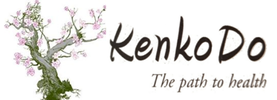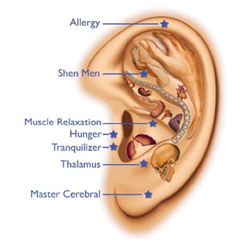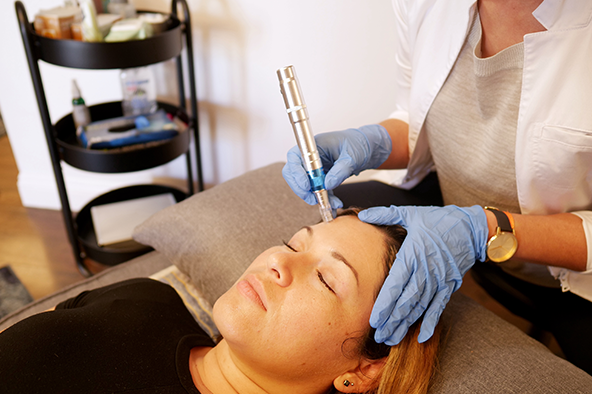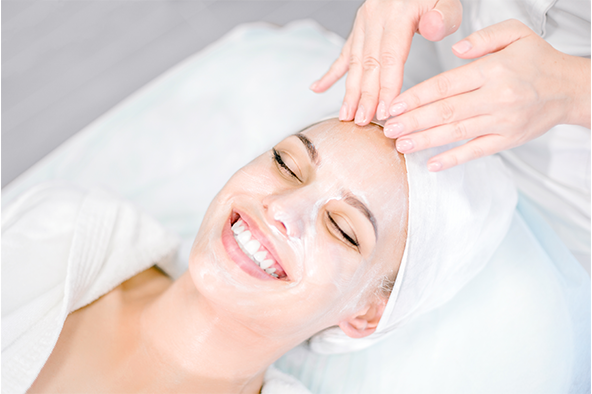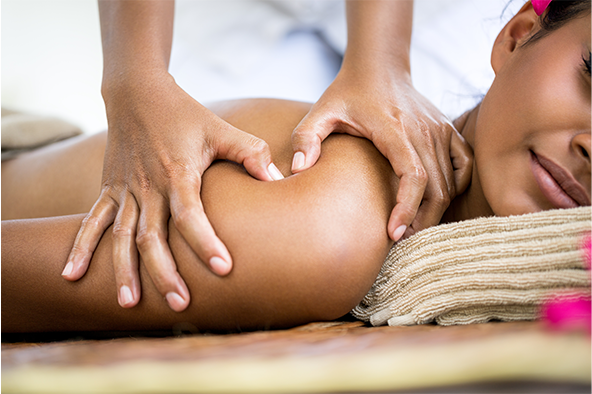WHAT IS ACUPUNCTURE?
Acupuncture is an ancient, time-tested method for preventing and treating various diseases, illnesses, and conditions. It involves the insertion of hair-thin, sterile, and disposable needles into various points located all over the different "meridians," or pathways of the body. In Western medicine, these pathways are often akin to areas where connective tissue is incredibly dense (joints and depressions along the muscles), and stimulating these areas are thought to propagate signals throughout the body. Acupuncture helps the mind and body achieve and maintain balance through a mechanism we call "Qi," or our body's natural energy. Acupuncture not only treats the symptoms that arise, but the root of the problem as well. Each person is treated specifically and individually based on what they are experiencing.
MEET OUR ACUPUNCTURIST
Estella Fan
Doctor of Acupuncture (DAc), Licensed Acupuncturist and Herbalist
Estella's Hours: Tues.: 9am - 5pm, Thurs: 12pm - 8pm, Sat: 9am - 5pm.
Doctor of Acupuncture (DAc), Licensed Acupuncturist and Herbalist
Estella's Hours: Tues.: 9am - 5pm, Thurs: 12pm - 8pm, Sat: 9am - 5pm.
Pricing
Acupuncture |
Initial Visit - 90 minutes/$135 |
Follow Up Visit - 60 minutes/$100 |
HEALTH INSURANCE
KenkoDo clinic now accepts the following health insurances: MassHealth, BlueCross BlueShield, BMC, Allways, Harvard Pilgrim, and Humana.
1. Does your specific plan cover Acupuncture Services?
2. If so, are there any diagnostic code restrictions? (some plans only cover acupuncture for certain conditions like back pain, migraine, insomnia...etc.)
3. Is there a co-pay? Deductible? Limit to the number of visits? Prior authorizations?
1. Does your specific plan cover Acupuncture Services?
2. If so, are there any diagnostic code restrictions? (some plans only cover acupuncture for certain conditions like back pain, migraine, insomnia...etc.)
3. Is there a co-pay? Deductible? Limit to the number of visits? Prior authorizations?
TREATMENT OPTIONS
|
Auricular Treatments:
Auricular acupuncture, or acupuncture of the ear, involves the treatment of specific points on the ear to address your symptoms. In Chinese medicine, the ear is viewed as a microsystem of the entire body, and therefore points in the ear are able to address issues throughout your entire body. Auricular treatments are shorter in duration, and are often administered while the patient is seated in a chair. |
Adjuncts:
Moxa Therapy
The dried herb Mugwort is used to invigorate Qi and blood and to warm the body. It is primarily a heat therapy.
Cupping/Gua Sha
Use of vacuum or scraping tools to leech out toxins through the skin.
Tui Na
Massage and bodywork that increases blood flow and circulation to affected areas.
Electro
Electrical stimulation for pain and neuropathy.
Moxa Therapy
The dried herb Mugwort is used to invigorate Qi and blood and to warm the body. It is primarily a heat therapy.
Cupping/Gua Sha
Use of vacuum or scraping tools to leech out toxins through the skin.
Tui Na
Massage and bodywork that increases blood flow and circulation to affected areas.
Electro
Electrical stimulation for pain and neuropathy.
FAQs ACUPUNCTURE
WHAT IS THE "BRANCH AND ROOT" APPROACH?
Acupuncture addresses health on many levels. Some acute problems that interfere with our quality-of-life emerge as branch symptoms of deeper root issues. We can offer immediate relief for many of these branch symptoms like headache, stiff neck, and PMS. However, we can also nourish the root of deeper imbalances within the blood and organs, such as chronic problems with cholesterol, blood pressure, and pain. By working on the root problems, the manifestations (branches) may resolve with time.
WHAT DOES ACUPUNCTURE TREAT?
Acupuncture aims to address a person's condition holistically, which means that while you may be seeking treatment for a very specific condition, you can also see benefits to other aspects of your health while you receive treatment. Examples of conditions treated include:
- Musculoskeletal pain: back pain, neck pain, limb pain, arthritis (OA, RA)
- Headaches, migraines
- GI disorders: nausea, vomiting, appetite control, bloating, acid reflux
- Sleep disorders
- Stress, anxiety, depression, fatigue
- Inflammatory conditions: acute injury, chronic inflammation, IBS
- Menopause: mood changes, hot flashes
- PMS, menses regulation
- Fertility issues
- Circulatory issues
- Respiratory conditions: colds/flu, immune system, asthma, smoking cessation
IS ACUPUNCTURE SCIENTIFIC?
In clinical trials, acupuncture has been shown to be effective for nausea, headaches, and digestive troubles. It has also been shown to help reduce pain and swelling pre-operatively and assist recovery post-operatively. Other studies have demonstrated acupuncture’s success in treating psychosomatic illness and syndromes that are resistant to Western interventions. Our clients come to us with a mix of ailments ranging from low-back-pain and stress, to diabetes and sleep disorders.
DOES ACUPUNCTURE HURT?
Acupuncture should not hurt. You may feel "Qi" sensations such as tingling, warmth, heaviness, or achiness at the point where the needle is, or in other areas of the body. If you are unsure about the needles, magnets and non-insertive needles (teishin) can be used to stimulate the acupuncture points as well. People are often surprised by how relaxed they feel once the needles are in and the healing has begun. It isn't uncommon for people to actually sleep throughout their treatment!
WHAT IS THE TRAINING FOR AN ACUPUNCTURIST?
Like other medical professions, acupuncture and Oriental medicine licensure is determined on a state-by-state basis. Massachusetts' standards are of the most rigorous in the United States, requiring a three- to four-year Masters degree program with 2050 hours of didactic and clinical training. In addition to learning Traditional Chinese Medicine, students must have also completed pre-med curriculum and four terms of Western Pathophysiology and Pharmacology in an effort to interface with Western medicine. Licenses are issued by the Board of Medicine of Massachusetts, and professionals must also be board certified by national standards, which requires three or four board exams: Biomedicine, Foundations of Chinese Medicine, Acupuncture with Point Location, and for herbalists, Chinese Herbology. Credentials to look for:
- Lic. Ac. or L. Ac. = Licensed Acupuncturist
- MAOM or MAc = Masters in Acupuncture and Oriental Medicine (can prescribe herbal medicine) or Masters in Acupuncture
- Dipl. Ac or Dipl. OM = Diplomate in Acupuncture or Diplomate in Oriental Medicine (can prescribe herbal medicine); national certification credentials
Learn more about our other services
Microneedling & Nanoneedling |
Skin Care |
Massage
|
Location |
|
